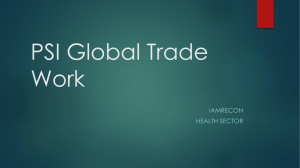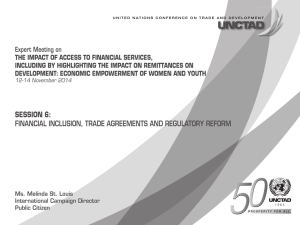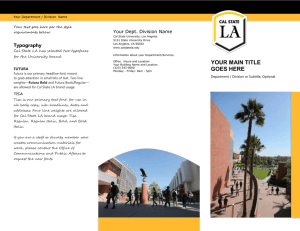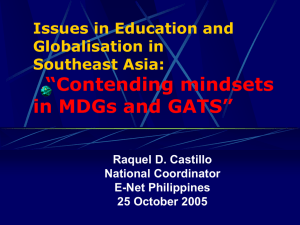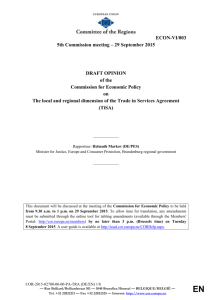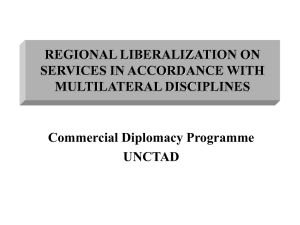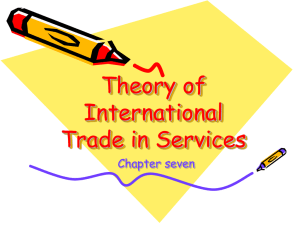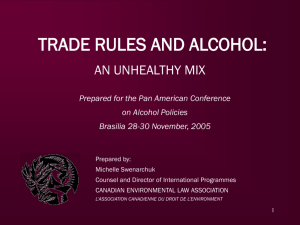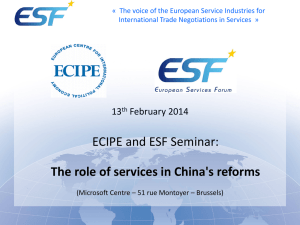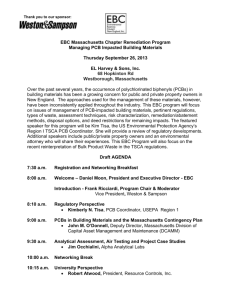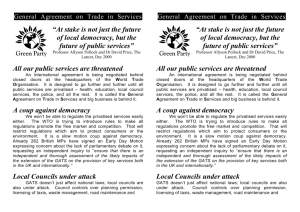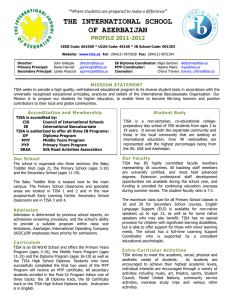PSI Global Trade Work
advertisement
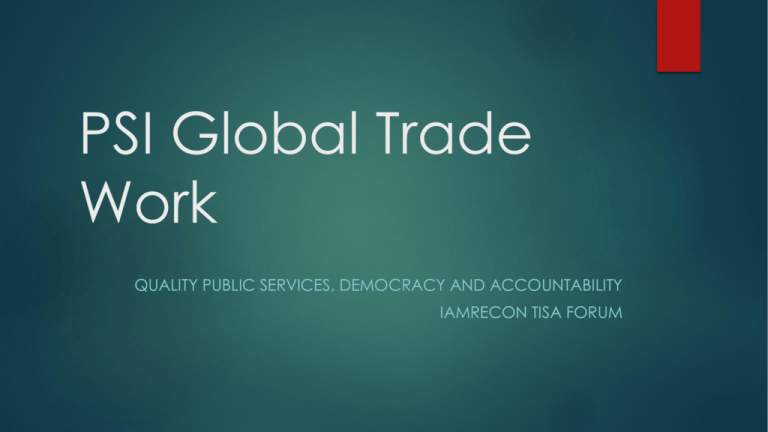
PSI Global Trade Work QUALITY PUBLIC SERVICES, DEMOCRACY AND ACCOUNTABILITY IAMRECON TISA FORUM The new wave of trade agreements Shift away from multilateral system FTA’s proliferating – over 2000 since mid 90’s Regional trade agreements expanding – new plurilaterals Not transparent – secret, exclusive Developing Country Service Commitments: Much greater in US FTAs than GATS Source: UNCTAD 2014 3 Not about tariff’s 97% removal of non-agricultural tariff's Investors rights Regulatory coherence Domestic regulation Beyond Non-Discrimination GATS prohibits public monopolies and exclusive service suppliers in committed sectors. Governments cannot restrict or require “specific types of legal entities” through which to supply services. applying ‘pro-competitive’ regulation to previously socialized services Undermines Democracy Will bind future governments Negotiations secret Will stop governments from delivering services in accordance with mandate (auto insurance case) Public Services are not commodities QPS: Provide basic social and economic necessities universally on the basis of need. Exists because markets will not produce these outcomes. Trade agreements: deliberately promote commercialisation and define goods and services in terms of their ability to be exploited for profit by global corporations and international service providers. Trade Agreements Effect Public Services Privatisation Ability to regulate Creates corporate rights that challenge state rights Insufficient carve-out for public services GATS excludes services provided “in the exercise of governmental authority.” defined as “any service which is supplied neither on a commercial basis nor in competition with one or more service suppliers.” Why a TISA? • • • • • Services Sector growth 2/3 of GDP but 20% of trade Doha round at a standstill GATS incomplete – TISA extends GATS Aim to pressure other countries to join after conclusion Who does it cover? Canada, Chili, Colombia, Costa Rica, Mexico, Panama, Peru, United States Australia, Hong Kong, Japan, New Zealand, Pakistan, South Korea, Taiwan Iceland, Norway, Switzerland, 28 members of the EU Turkey, Israel 60% of worlds services But the aim is for all countries to join Uruguay Mauritius History of TISA Started in early 2013 Secret negotiations in Geneva every 8 weeks Extension of GATS Heavily lobbied for by USA Coalition of Service Industries What services does it cover? cross border services (GATS Mode 1), Telemedicine, online health services, online drug purchases; consumption abroad (GATS Mode 2) medical tourism; foreign direct investment (GATS Mode 3) multinational corporations buying or establishing private hospitals, clinics, laboratories etc temporary movement of persons (GATS Mode 4) such as nurses, doctors, personal carers, health executives temporarily travel abroad to provide services. Effects on public services Standstill - confining public services within existing boundaries, Ratchet - locking in future (failed) privatization Negative list - Future services Domestic regulation Binding rules that allow corporations to challenge new or costly regulations – even if domestic and foreign treated the same Covers qualification requirements, technical standards and licensing requirements Worker safety, environmental, consumer protection, universal service obligations, water standards, municipal zoning, toxic waste transport, educational institutions etc Ability to regulate? Necessity test Decision making cant involve undue delays Licensing And some more problems……. State owned enterprises and foreign competition (subsidies) Government procurement – local purchasing Who wants the TISA? The TISA was conceived: “to allay business frustration over the stalled Doha Round outcomes on services.” The Global Services Coalition in a letter to the European Commission (September 10, 2013). The US Coalition of Service Industries (CSI) set up a TeamTISA to promote TISA Microsoft JP Morgan Chase CHUBB Deloitte UPS Google Verizon Walmart Walt Disney IBM and more. Who else? Financial Services text from Wikileaks shows that the following organisations support the TISA: US Securities Industry and Financial Markets Association US Chamber of Commerce Canadian Services Coalition Coalición Mexicana de Servicios American Insurance Association VISA Bloomberg Financial information Services What do they want? Walmart in its submissions to the US Trade Representative (USTR) sees the TISA as a way to free itself of restrictions on the sale of pharmaceuticals, medical devices, alcohol and tobacco and avoid zoning laws FEDEX in its submissions to the USTR seeks the elimination of “regulatory advantages historically conferred on national post offices”. In other words it sees the TISA as a way to force the deregulation of the postal system. PSI is leading and mood is changing AFL-CIO ETUC TUC Civil Society Global Day of Action - 18 April What to do? Understand how the agreements effect your members Understand how they effect workers and democracy Explain more than tariffs and trade Work with civil society allies Reach out to private sector unions Influence your national centre Lobby your government Involve line agencies
